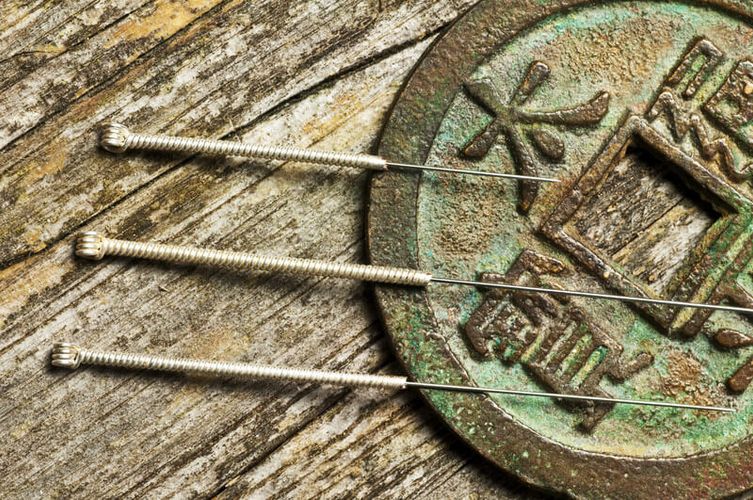What is Acupuncture?
In order to understand what Acupuncture is, we first need to define it. Acupuncture is an ancient healing technique in which practitioners insert fine, sterile needles very shallowly into the skin at specific points on the body. Traditional Chinese Medicine (TCM) is a holistic system of health care that has been used for 2500 years to prevent and cure disease and promote longevity. TCM teaches that acupuncture supports the free flow of energy in the body, while contemporary science has found that acupuncture stimulates the stress-reducing parasympathetic nervous system, helping the body to relax. There are multiple schools of acupuncture and philosophies that guide each practitioner's style of practice, primarily a Japanese tradition and a Chinese tradition with subsequent schools and lineages developed under each.
Acupuncture affects every major system of the body, including the following five systems:
- The Cardiac System
- The Endocrine System
- The Gastrointestinal System
- The Immune System
- The Neurological System
From a modern perspective, acupuncture, within the larger modality of traditional Chinese Medicine, is a versatile complementary medical therapy that can be useful for treating a myriad of conditions. It reduces inflammation and stress, relieves pain, and assists the body in healing itself by improving a person's internal terrain and balance. Acupuncture works well in combination with virtually any other healing modality.
In short, acupuncture can assist in creating a healing environment. It can be an excellent therapy choice from a holistic, functional medicine, and wellness viewpoint, when our goals are to treat the person, not the diagnosis, and to heal the root causes of disease, not just treat symptoms. Today, many medical traditions embrace acupuncture for these very reasons.
However, the oral tradition of acupuncture is ancient, with the first written accounts of the practice going back more than 5000 years, and incorporating concepts of "qi," or vital energy and the balancing of yin and yang energies, often associated with masculine and feminine or hot and cool elements.
Along with acupuncture, you will find that many practitioners also use:
- Moxibustion
- Herbal remedies
- Cupping
- Dermal friction (often called Gua Sha)
- Massage
Acupuncture Near Me
When looking for "acupuncture near me," while driving around in your city, you will want to find an acupuncturist that can explain their methodology in detail to you. There are two primary schools of acupuncture, and each has its own methods. You can expect two main styles from the primary schools of acupuncture.
The Chinese school of acupuncture usually uses thicker needles and inserts them more deeply, in an effort to encourage "qi" to move.
The Japanese style of acupuncture also referred most commonly to as Kiiko Matsumoto style (KMS), though there are other primary Japanese teachers, uses thinner needles, and inserts them into more superficial layers of the skin and muscle. The belief is that "qi" can be encouraged to flow gently, and though it may take more acupuncture sessions to help correct health issues, the practice can encourage greater health without the side-effects that more aggressive "qi" manipulation can cause.
Chinese acupuncturists will also insert needles at the location of the meridians and energy points as they were taught while Japanese acupuncturists usually palpate their client's skin before insertion. The aim is to "feel" via manual touch where the needle should go exactly.
Of course, there are acupuncture practices that evolved throughout all of Asia, including Korea, Vietnam, Okinawa, and elsewhere in the region that spread across the rest of the world.
Both primary philosophies of acupuncture have thousands of years of documented benefits, so you should choose your acupuncturist with confidence that either the Japanese acupuncture or the Chinese acupuncture method will be effective. One will likely suit your preference better.
In addition to these two main branches of acupuncture, there are numerous other types described below.
How does Acupuncture Work?
According to the philosophy of Traditional Chinese Medicine, disease is caused by disruptions in the flow of energy, or qi (pronounced "chee"), in the body. The placement of acupuncture needles stimulates the release of qi, freeing it to move through channels, known as meridians, promoting health and healing. These are the very same meridians described in yogic practices, although traditionally called nadis.
As allopathic doctors who have studied acupuncture can attest, when these energy channels are cleared of impediments, they seem to help usher life force to the organs, cells, and even DNA.
Contemporary scientific inquiry is pointing to ways in which acupuncture removes some of the barriers to healing for mind, body, and spirit, and is beginning to help us further understand some of its mechanisms and benefits. We know that acupuncture stimulates the vagus nerve, command central for your parasympathetic nervous system which controls your "rest-and-digest" mode (in contrast to the "fight-and-flight" response). This reduces stress and inflammation, which are major underlying causes of disease.
Importantly, acupuncture has also been shown to be an immune system builder, stimulator, and balancer. Think about all the things the immune system supports and protects, including our:
- Circulatory system
- Lymph system
- Endocrine system
- Musculoskeletal system
- Digestive system
A lot of the immune system is in the gut, where a healthy immune system encourages the growth of good bacteria. Additionally, acupuncture increases the production of natural killer (NK) cells, which protect against pathogens including viruses, bacteria, and parasites.
Andrew Weil, MD, a pioneer of Integrative Medicine, comments that "...ultimately acupuncture is a remarkably simple technique that depends entirely upon one thing: the stimulation of the peripheral nervous system."
Types of Acupuncture
In addition to the ancient acupuncture associated with Traditional Chinese Medicine (TCM), there are a variety of forms of acupuncture available for treatment today. What are the differences among these various options?
Medical Acupuncture
Medical acupuncture, as opposed to traditional Chinese acupuncture, is a form of acupuncture provided by doctors trained and licensed in Western medicine who are also trained in acupuncture as a specialty practice. These doctors use acupuncture as needed to treat and prevent disease. Medical acupuncture is also used in tandem with allopathic medicine as an adjunct therapy. For example, cancer patients who receive chemotherapy treatments may also rely on acupuncture to reduce pain, swelling, and inflammation.
Traditional Chinese Medicine (TCM)
The art of acupuncture is one aspect of the 2500-year old medical practice of Traditional Chinese Medicine (TCM), which also includes various forms of herbal medicine, massage (tui na), exercise (qigong and tai chi) and dietary therapy. Acupuncture also exists as part of ancient Japanese and Korean health traditions. TCM practitioners today continue to use acupuncture as a key part of their healing approach.
Five-Element Acupuncture
A specific tradition within TCM. Diagnosis and treatment in classical Five-Element Acupuncture rest upon an assessment of the individual in relation to the five elements of wood, fire, earth, metal, and water. Five-element acupuncture seeks to use that assessment to bring you back into harmony with yourself on the levels of body, mind, heart, and spirit.
Community Acupuncture
Part of a nationwide movement to improve access to acupuncture therapy. Rather than a private one-on-one session, in community acupuncture, individuals are treated in a group and often charged on a sliding scale. This form of practice is offered in many locations internationally, especially in Asia, and has also become popular in a number of US cities.
Auricular Acupuncture
Auricular acupuncture involves the placement of needles to stimulate points on the external surface of the ear which has the potential to affect health conditions and systems throughout the body. It is sometimes used in group settings such as retreats to allow many people to receive beneficial acupuncture treatments at one time. For someone nervous about a full-body acupuncture treatment, auricular acupuncture can be a good place to start.
Acupuncture benefits: what can acupuncture treat?
Because it can affect so many aspects of the body, acupuncture has been found to promote wellness in many ways. In addition to balancing the immune system, reducing inflammation, and lowering stress.
Benefits of acupuncture include reducing pain, such as:
- mid back pain
- upper back pain
- neck pain
- muscle, joint, and myofascial pain
- menstrual cramps
- ameliorating nausea, including symptoms post-chemotherapy
- helping reverse autoimmunity
- treating allergies
Acupuncture has also been found to be effective for those suffering from:
- hormonal imbalances
- digestive problems like IBS
- osteoarthritis
- fertility issues (female or male)
- asthma
- anxiety
- PTSD
- ADD/ADHD
People struggling with mood and emotional issues, including anxiety and depression, anger, and insomnia, have also found success working with acupuncture. In other words, for almost any condition you can think of, acupuncture is, at the very least, worth trying.
Acupuncture is particularly helpful for any condition that is exacerbated or made worse by stress (which is to say most, if not all, health conditions). Because acupuncture specifically works with the parasympathetic nervous system, which tells the body that it's time to calm down after a period of stress, acupuncture can help you to stop living in the high-stress, draining fight-or-flight mode, and bring your body back to a more grounded state. Acupuncture is particularly well-known for treating certain conditions. We'll discuss those next...
Read more about the Benefits of Acupuncture
Acupuncture and Back Pain
Acupuncture is most often used in US hospitals to treat pain, especially back pain and neck pain. It's also used to treat osteoarthritis, knee pain, muscle and joint pain, myofascial pain, headaches, and the frequency and intensity of migraines.
In a large study on acupuncture and pain published in the Journal of the American MedicalAssociation (JAMA) Archives of Internal Medicine in 2012, the authors found that acupuncture is effective for treating chronic pain. This finding is particularly significant because as a meta-analysis of 29 studies, it involved data from nearly 18,000 patients.
Read more about Acupuncture for Back Pain

Acupuncture and Stress
Stress is an underlying cause of the majority of chronic diseases, and chronic stress may lead to life-threatening illnesses such as strokes, heart attacks, kidney disease, and cancer.
Evolutionarily, our bodies are meant to be at rest most of the time. After foraging, hunting and working, our primal ancestors would have spent the rest of their day relaxing, sleeping and sitting under a tree. Our vagus nerve, the brain's central command center for relaxation, would have been activated roughly ninety percent of the time.
Andrew Wong, MD, a functional medicine practitioner and certified medical acupuncturist in the Washington, DC area, estimates that among his patients, the ratio is reversed: ninety percent stress to ten percent relaxation. In addition, he points out that we spend ninety-three percent of our time indoors (including six percent in automobiles) and only seven percent outdoors. This means we're not connecting to the earth that naturally enhances our life force, improves brain function, and elicits a relaxation response.
Acupuncture can help us relax in the middle of the stress of modern life. Regular acupuncture treatment increases endorphin levels and boosts serotonin and dopamine, all neurochemicals that make us feel good. Acupuncture helps balance our nervous system, promote healing, and optimize well-being.
Denver acupuncturist and educator, Jennifer Leonard, LAc, comments, "Everybody feels the stress relief that comes from acupuncture. I don't know anybody who walks away from an acupuncture treatment who doesn't feel lighter and less stressed." Acupuncturist Cory Jecmen adds, "Given the same circumstances - I'm not going to change my job or my relationship - acupuncture does a beautiful job of supporting stress resilience. It helps patients turn the volume down on stress, see more clearly, and eventually make better decisions."
Acupuncture and Anxiety
Acupuncture is increasingly used as a specific treatment for anxiety (as well as the depression that often goes hand-in-hand). The Anxiety and Depression Association of America lists acupuncture among viable complementary and alternative practices that may be useful for the treatment of anxiety and depression disorders, stating, "Evidence for the use of acupuncture...to treat anxiety disorders is becoming stronger." This makes sense, as acupuncture specifically works to bring the body out of the anxiety-producing fight-or-flight state.
Acupuncture and Depression in Pregnancy
Acupuncture may be an excellent option for treating depression, especially postpartum depression. A review article entitled "Acupuncture for Treating Anxiety and Depression in Women: A Clinical Systematic Review" published in 2013 in the journal Medical Acupuncture found high-level evidence to support the use of acupuncture for treating major depressive disorder in pregnancy. While further research would be beneficial, the results are promising.
Acupuncture and Emotions
In addition to potentially helping with both anxiety and depression, acupuncture may assist in balancing a full range of emotions - especially excessive or repressed emotions, such as anger, sadness, and grief, for which acupuncture therapy can provide tremendous relief. Patients may find themselves weeping unshed tears while on the table, and feeling significantly lighter afterward. Acupuncture has also been found to assist with characteristic symptoms of PTSD such as migraines, depression, anxiety, and insomnia. Here's more on Acupuncture for PTSD.
Acupuncture and Fertility
Acupuncture can be a natural, safe and effective treatment to improve fertility and boost chances for conception. Indeed, Traditional Chinese Medicine doctors have used acupuncture to work with infertility for thousands of years. The American Pregnancy Association recommends acupuncture for various underlying causes of infertility as well as pre- and post-fertility insemination, prevention of miscarriage and polycystic ovarian syndrome (PCOS).
Read more about Acupuncture for Fertility
Acupuncture and Headaches
Acupuncture may be an effective treatment for both migraines and headaches. Research on the subject is encouraging. For example, a 2012 meta-analysis of data on the use of acupuncture with migraine and tension headaches showed that actual acupuncture was more effective than either no acupuncture or simulated acupuncture in reducing headache frequency or severity.
Acupuncture and Weight Loss
Is acupuncture for weight loss effective? Acupuncture can be a highly effective addition to a weight loss program, especially because it helps reduce the stress and inflammation that exacerbate weight gain. However, it is worth noting that acupuncture is a complimentary weight loss technique; acupuncture alone won't likely lead to significant changes in weight unless accompanied by a healthy diet and regular exercise.
Acupuncture and Optimal Health
Why would a person who is generally well, consider acupuncture? Traditional wisdom recommends acupuncture for preventative therapy as the seasons change, to support an overall program of wellness. Good advice! But an exciting modern reason would be because acupuncture has been shown to stimulate stem cell growth and stem cell regeneration, making one of the oldest therapy approaches in the world also one of the best for optimal health, disease prevention and longevity.
Acupuncture safety and side effects: FAQs
People often ask about acupuncture side effects, if there are risks, and whether or not it's safe. These are several of the most frequently asked questions about a therapy that may seem mysterious to those who've not yet tried it.
Does acupuncture hurt?
Typically, no, acupuncture doesn't hurt. Hair-fine, flexible, sterile needles are inserted so shallowly into the skin that the individual receiving treatment barely feels a prick, though the sensation may be more notable on certain acupuncture points.
Is acupuncture safe?
The National Institutes of Health considers acupuncture to be generally "...safe when performed by an experienced, well-trained practitioner using sterile needles." The Federal Drug Administration (FDA) regulates acupuncture needles as medical devices.
Does acupuncture have side effects?
Acupuncture is found to have virtually no side effects, other than possibly very minimal discomfort as the needles are applied. Most people don't even report this.
What is treatment like?
People who have never had acupuncture often ask what acupuncture treatment is like. We created an entire page outlining the answer to that question.
Cory Jecmen adds, "Acupuncture offers what I call beneficial side effects. You come in the door for a sore elbow or fertility, for example, and find your anxiety is decreased. I don't have to work on that directly, it just sort of happens with whatever else we're working on.:"
How much does acupuncture cost?
If you're wondering how much it costs to get an acupuncture treatment, we created an acupuncture cost guide to help show the cost of acupuncture treatment in various cities.
The following experts reviewed and contributed to this article:
Andrew Wong, MD, Licensed Acupuncturist and Acupuncture Educator
Cory Jecmen, MAc, LAc, Licensed Acupuncturist
References:
Acupuncture: In Depth
A current summary of a Western science view from the National Institutes of Health's National Center for Complementary and Integrative Health.
Select Studies
The Neuroimmune Basis of Anti-inflammatory Acupuncture
Ben Kavoussi, MS, B. Evan Ross, DOM, LAc.
Integrative Cancer Therapies, 2007
Acupuncture for Treating Anxiety and Depression in Women: A Clinical Systematic Review
David P. Sniezek and Imran J. Siddiqui
Medical Acupuncture, 2013
Acupuncture for Chronic Pain: Individual Patient Data Meta-Analysis
Andrew J. Vickers, DPhil; Angel M. Cronin, MS; Alexandra C. Maschino, et al
Journal of the American Medical Association (JAMA) Internal Medicine, 2012
Ted J. Kaptchuk, The Web That Has No Weaver: Understanding Chinese Medicine.
Harriet Beinfield, Between Heaven and Earth: A Guide to Chinese Medicine.
Cyndi Dale, The Subtle Body: An Encyclopedia of Your Energetic Anatomy.













